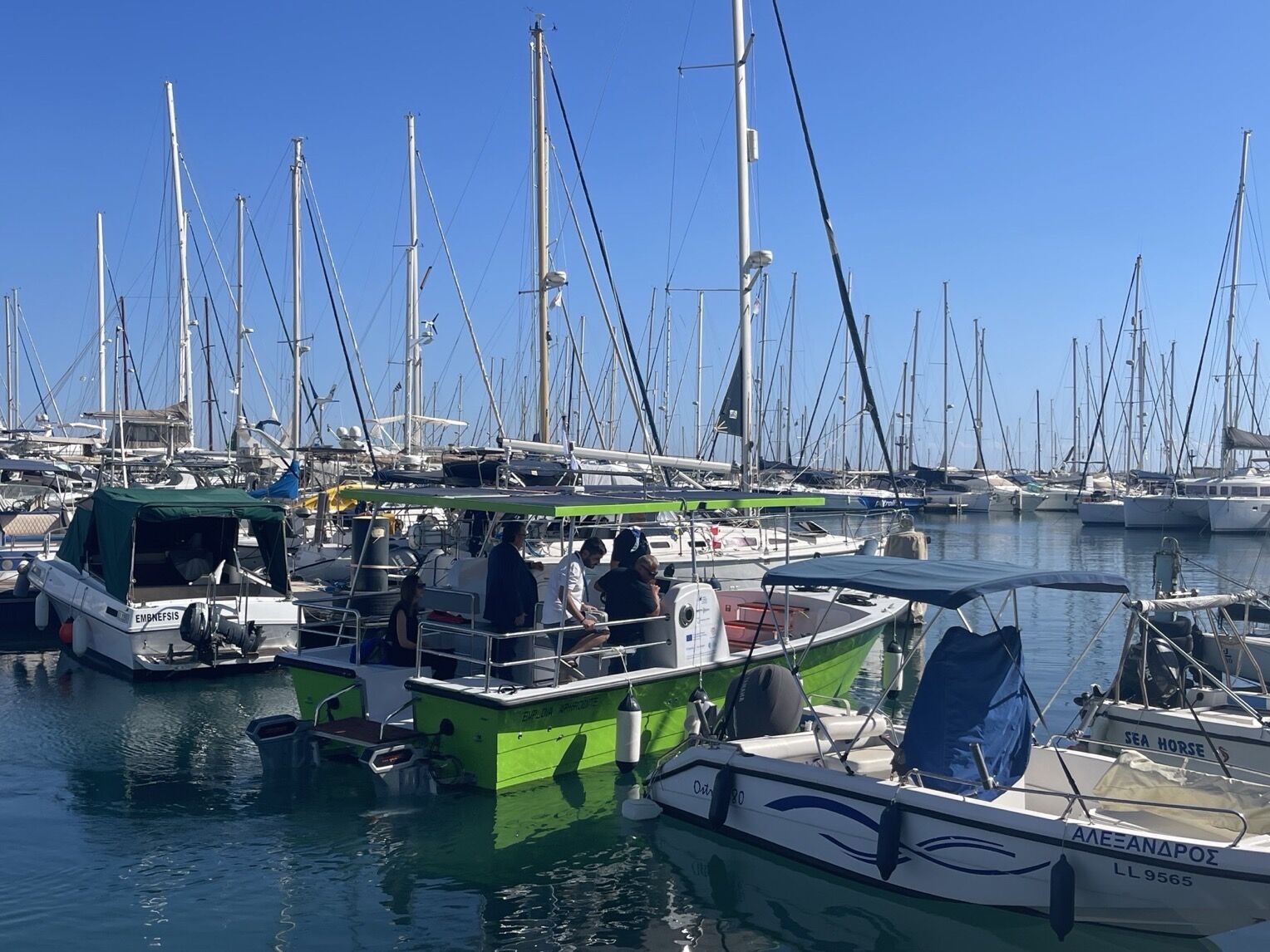Cyprus introduced its first zero-emission vessel, Evploia Aphrodite, at Larnaca Marina this week, with the support of Deputy Shipping Minister Marina Hadjimanolis.
Evploia Aphrodite, developed by the Cyprus Marine and Maritime Institute (CMMI) with funding from the EU’s Co-Develop programme, is a fully electric vessel that reduces emissions along Cyprus’ coastline.
It’s part of the wider Zero Emission Sea Transporter (ZEST) initiative, designed to reshape the local maritime sector. With near-silent propulsion and a battery-powered system, the vessel is both eco-friendly and practical for short-sea routes, helping to protect Cyprus’ sensitive marine ecosystems.
At the naming ceremony, Agriculture Minister Maria Panayiotou described Evploia Aphrodite as “the beginning of a new, more sustainable era for our shipping industry,” setting a path toward a “more environmentally friendly future.”
The zero-emission technologies developed through the A-ZEST programme, she added, are a key step in “creating innovative solutions” and offer “an important prospect for green transport.”
Panayiotou highlighted the broader impact of the project, saying the “smart” digital solutions and autonomous operations expected to emerge could be highly valuable beyond the shipping sector.
Such advancements, she noted, have the potential for technology transfer to other fields within the Ministry of Agriculture, Rural Development and Environment’s remit.
Deputy Minister Hadjimanolis praised the vessel as a pioneering step, particularly crediting CMMI for “leading the way toward a fossil fuel-free future” by building Cyprus’ first zero-emission vessel.
Evploia Aphrodite, she noted, is “a realistic, sustainable solution for short-haul routes along our shores.”
She added that supporting research like this “is essential for a sustainable blue economy” and for advancing ocean protection.

As the maritime industry faces mounting pressure to cut emissions, the International Maritime Organisation (IMO) is calling for a 30 per cent reduction by 2030, working towards net-zero by 2050.
For Cyprus, an island reliant on maritime transport, meeting these targets is critical. The EU’s Fit for 55 legislative package reinforces this, setting CO2 limits for vessels at EU ports.
Speaking on behalf of Larnaca’s Mayor Andreas Vyra, Voroklini Mayor Neofytos Fakontis reflected on the vessel’s significance, noting that “the naming ceremony marks five years of meaningful progress at the Institute.”
He emphasised that the achievement “demonstrates what can be accomplished when inspiring scientists and researchers join forces with seasoned professionals and innovative businesses.”
According to an announcement, Evploia Aphrodite is a milestone in Cyprus’ sustainable maritime journey. Charged entirely from renewable sources, its advanced power management system ensures zero emissions and high efficiency.
For Cyprus, it was explained, the vessel brings a practical way to reach its decarbonisation targets.
Chief Scientist Demetris Skourides expressed optimism for Cyprus’s maritime future, stating that “today’s event highlights what Cyprus can achieve by harnessing research, technology, and innovation in this key sector.”
He suggested that ZEST could serve as “a benchmark for new autonomous, zero-emission platforms,” with applications in airborne and subsea systems that open fresh opportunities for the country.
Beyond its immediate impact, Evploia Aphrodite will also serve as a research platform, enabling studies into battery efficiency, power management, and digital twin technology, which simulates and optimises vessel performance.
Zacharias Siokouros, CEO of CMMI, highlighted the project’s broader impact. He said that “at CMMI, our guiding belief is that ‘for a sustainable and competitive future, we need research that is valuable today, useful now, has a measurable impact, addresses challenges, and answers questions”,
He added that the Institute’s close partnership with Cyprus’ industrial ecosystem is key to realising this vision.
He underlined the contribution of local companies, including SignalGeneriX and FP Marine, to the vessel’s development.
“Our vision is to continue on our path with even more research successes, while maintaining the spirit and dynamism of a start-up, and creating spin-offs that will further enrich the respective ecosystem and economy,” he said.
The ZEST project addresses one of the biggest challenges facing the maritime sector: reducing greenhouse gas emissions.
Coastal vessels, especially those on short-sea routes, contribute significantly to emissions, and replacing diesel-powered boats with electric ones like Evploia Aphrodite aims to make a major impact.
But the project isn’t just about cutting emissions. By integrating renewable energy with efficient battery systems, Evploia Aphrodite provides a model for sustainable energy use within the maritime sector, setting a new standard for Cyprus and the region.
The event concluded with a formal naming ceremony and a brief trip around Larnaca Marina.
Guests viewed the vessel’s research equipment and saw first-hand what CMMI is doing in sustainable maritime innovation, taking a glimpse into Cyprus’ vision for a greener future at sea.


